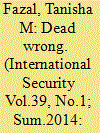| Srl | Item |
| 1 |
ID:
134089


|
|
|
|
|
| Publication |
2014.
|
| Summary/Abstract |
Is war in decline? Recent scholarship suggests that it is. The empirical basis for this argument is a decline in battle deaths over the past several centuries, a standard metric for counting wars and armed conflicts. Dramatic improvements in medical care in conflict zones-in preventive medicine, battlefield medicine, evacuation, and protective equipment-have raised the likelihood of surviving battle wounds today compared with past eras. Thus the fact that war has become less fatal does not necessarily mean that it has become less frequent. Original data on wounded-to-killed ratios, supplemented by medical research and interviews with physicians from the military and nongovernmental communities, is used to advance this claim. The results show that the decline in war is likely not as dramatic as some scholars have argued. These findings question the foundation of existing datasets on war and armed conflict. They also highlight the growing need for policy focused on the battle wounded.
|
|
|
|
|
|
|
|
|
|
|
|
|
|
|
|
| 2 |
ID:
169096


|
|
|
|
|
| Summary/Abstract |
When military community closure occurs, it can be challenging for service members and the surrounding community. Given that services and social networks disappear; this is particularly salient in overseas locations. Few studies have systematically assessed the impact of base closure on military community members. In the present study, 743 soldiers, 114 Army civilian employees, and 54 military spouses living in two closing U.S. military communities in Germany were surveyed about transformation stressors, mental health, and factors associated with better adjustment such as individual coping, leadership behaviors, and community cohesion. While individual coping was associated with fewer sleep problems, and individual coping and leadership were associated with less psychological distress, community cohesion generally overrode these effects in the final step of regression models. Thus, while coping and leadership are important, community connection appears to confer benefits to the affected individuals even in the context of base closure.
|
|
|
|
|
|
|
|
|
|
|
|
|
|
|
|